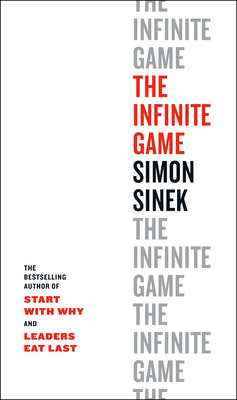Embracing the Infinite Game…
In the world of business, the rules are not as fixed as they may seem. Unlike the finite games we’re accustomed to, where winning is everything like chess or football, the business landscape operates as an Infinite Game. This concept, outlined in Simon Sinek’s book “The Infinite Game,” challenges leaders to adopt an infinite mindset for long-term success and sustainability.
There are highs and lows in any project delivery but we have to keeps our eyes on the end goal. That goal is delivering value to the business in the long term. Companies that recognise the long term value of their employees, helping them to grow and develop leads to fulfilled individuals that in term deliver a good service, product and profit for the business.

I like this book because it focuses on a long term perspective based on trusting robust relationships. Companies that do the right thing even when it is difficult for the right reasons are the ones that are playing the infinite game.
The Key themes of the book:
Below is a summary of the book with some of my thoughts and examples to illustrate the point.
Adopting an Infinite Mindset for long-term success and sustainability:
Embracing the reality that business is an Infinite Game demands a shift in mindset. The focus should be on creating a lasting impact rather than solely pursuing short-term profits. A company’s strength is not solely measured by its financial success, but by its ability to weather challenges and remain relevant for generations. Many successful business have come out of adversity as individuals creatively support their families through dark days.
Disney – Was started in 1929 at the start of the great depression by two brothers Walt and Roy they had a creative vision to entertain. They created the first feature length animated film Snow White during the worst economic downturn in America’s history. Today they remain a brand that has stood the test of time.
Lego – Was started by a carpenter Ole Kirk Kristiansen struggling in his business and grieving from the lost of his wife and four young boys to support. He transformed the business from a traditional carpentry business to toy manufacture. Today they are a multi-generational company that has stood the test of time and created a lot of joy and creativity.
Practices for Success in the Infinite Game:
Five key practices form the foundation for playing the Infinite Game effectively. These practices ensure that a business remains resilient and adaptable, fostering long-term growth and success.These include
- Establishing an inspirational Just Cause,
- Building Trusting Teams,
- Learning from Worthy Rivals,
- The changing business landscape
- Demonstrating the Courage to Lead.
1. An Inspirational Just Cause.
I like the inspirational just cause at Starbucks started by Howard Schultz and updated by Laxman Narasimhan:
“With every cup,
Starbucks mission statement
with every conversation,
with every community–
we nurture the limitless possibilities of human connection.”
I love this mission statement as it speaks of the need for human connection through conversation, community and a cup of coffee. We may not always agree with each other but when we focus on human connection and take the time to understand and listen to each other we can break down a lot of barriers and learn to live together in harmony. The ethos for this extends from the plantations that produce the coffee beans to the partners in the stores to the customers enjoying the experience. This creates a sustainable brand that makes the right decisions for the right reasons.
2. Building Trusting Teams
It sometimes feels like we spend more time with our co-workers than our famiiles. In any project as we work towards a common goal we actually develop profound relationships with our co-workers and build a sense of community. The human spirit is one of trust and love and as we seek to foster these attributes we find fulfilment in the work we do. We can go through the high and lows of project delivery with all the associated emotions. At the end of the day if the project is successful or not we have built something and hopefully learned something along the way.
Prioritizing Employees for Long-Term Success:
In an Infinite Game, the well-being and commitment of employees are pivotal to sustained success. Investing in employee well-being, as exemplified by companies like Costco and The Container Store, not only fosters loyalty and motivation but also translates into improved customer service and business performance. Prioritizing the needs and development of employees can lead to a positive work environment and long-term stability.
The Container Store’s employee satisfaction translates directly into bottom-line success: the company has grown from a founding $35,000 investment in 1978—about $131,000 in today’s currency—to earn over $800 million in net sales in FY 2017. “A good capitalist will see the value of what we’re doing,” co-founder Kip Tindell says. “We would not be as profitable if we did less for our employees and vendors.”
Kip Tindell, The Container Store
According to Jim Sinegal, founder of retail giant Costco, the company’s culture drives its business strategy. Costco’s success turns on its ability to recognize and respect what Sinegal calls “what we stand for in the customer’s eyes, and what we mean to all of the stakeholders in our business.” Those core tenets include putting the customer first, rewarding its employees, and valuing its suppliers.
Jim Sinegal, Founder of retail giant Costco
Fostering a Culture of Trust and Ethical Conduct:
Building a culture of trust is paramount for the success of any business. Open communication and a supportive environment encourage employees to speak up, fostering a culture of ethical conduct and reducing the risk of unethical practices and distrust. Prioritizing trust and ethical behavior can create a strong foundation for sustainable growth and positive stakeholder relationships.
In fact, according to a study in Harvard Business Review, people at high-trust companies report 74% less stress, 106% more energy at work, 50% higher productivity, 13% fewer sick days, 76% more engagement, 29% more satisfaction with their lives, and 40% less burnout than people at low-trust companies.
Zak, Paul, “The Neuroscience of Trust,” Harvard Business Review, 2017.
3. Learning from Worthy Rivals and Embracing Change:
Acknowledging the value of Worthy Rivals and being open to change are critical for long-term success. Analyzing competitors’ strategies and embracing necessary changes, even if they seem daunting, can lead to innovative breakthroughs and sustained relevance. Embracing a culture of learning and adaptability can foster a spirit of innovation and ensure continued relevance in a dynamic market.
4. The Changing Landscape:
The traditional notion of capitalism has evolved, emphasizing shareholder interests over consumer welfare. However, a return to Adam Smith’s original vision, which prioritizes customer satisfaction, can foster a healthier and more sustainable business environment. Emphasizing the importance of customer-centric approaches can lead to increased customer loyalty and sustained profitability.
Amazon 1-Click – Web ordering for me is the benchmark of customer-centric approaches which creates loyal customers. Reducing the friction for your customer to order from you has been the hallmark of Jeff Bezos success with Amazon since 1997.
Apple’s customer centric approach generates brand loyalty where they make the best product from a customer experience and technology standpoint. It costs 10 times the amount to acquire a new customer than it takes to upsell to a current one and this pay dividends. The expectations of the customers are exceeded regularly in product launches and Apple has sustained this from the iPod, iPhone, iPad, laptop, desktop, Apple watch etc over the last two decades and doesn’t show sign of slowing down. We have yet to see what Apple will do with Generative AI and the virtual reality headset Vision pro.
5. Demonstrating Courage in Leadership:
Leadership in the Infinite Game requires courage and commitment to the Just Cause. CEOs must embrace their roles as Chief Visionary Officers, making decisions that align with the company’s long-term goals and values, even if they diverge from conventional wisdom or short-term gains. Demonstrating courage in making ethical and sustainable decisions can set an example for the entire organization and pave the way for long-term success and sustainability.
By understanding and implementing the principles of the Infinite Game, businesses can foster a culture of growth, resilience, and ethical conduct, ensuring lasting success in an ever-evolving business landscape.

